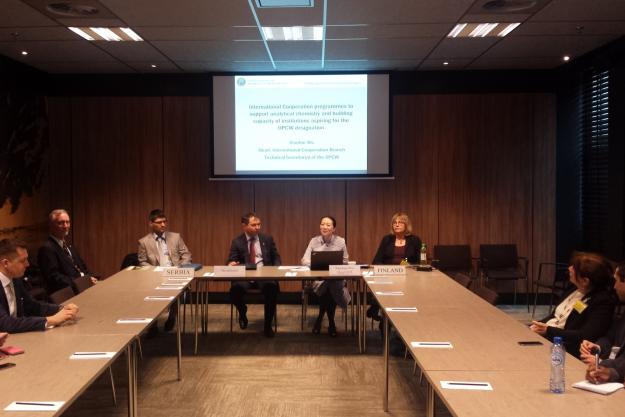
Participants at a Conference of States Parties Side-Event about the OPCW’s new Laboratory Twinning Project
Thirteen Member States learned about the first successes of the Organisation for the Prohibition of Chemical Weapons’ (OPCW) Laboratory Twinning initiative during a side event at the Twenty-First Session of the Conference of States Parties in The Hague on 1 December 2016.
“We want to help institutions who are keen to gain the OPCW’s accreditation by getting them to learn from the laboratories in our Designated Laboratory network,” explained Ms Xiaohui Wu, Head of International Cooperation Branch of OPCW’s International Cooperation and Assistance Division (ICA).
Achieving OPCW Designated Laboratory status is conditional on passing a stringent set of OPCW examinations, called Proficiency Test. The twinning initiative opens the door for laboratories to partner with the more experienced laboratories with the mediation from and the support of the OPCW, as they work to pass the Proficiency Test and achieve OPCW designation status.
The event also showcased the positive results of the long term assistance from VERIFIN (Institute of Verification of the University of Helsinki, Finland) to the Centre for Instrumental Analysis of the University of Belgrade, Serbia. According to the presentation delivered by the Centre, this support and mentorship helped them to achieve top marks in a recent Proficiency Test. Thus it can be truly considered as the first positive example of twinning.
This new initiative has been met with enthusiastic reception by the labs interested in mentoring – nine institutions in six Member States have expressed interest in the project. The Technical Secretariat through ICA’s Programme, is now consulting with Designated Laboratories to support their peers in Africa, Latin America and the Caribbean, Eastern Europe and Asia.
Background
As the implementing body for the Chemical Weapons Convention, the OPCW oversees the global endeavour to permanently eliminate chemical weapons. Since the Convention’s entry into force in 1997 – with its 192 States Parties – it is the most successful disarmament treaty eliminating an entire class of weapons of mass destruction.
To date, nearly 94 per cent of all chemical weapon stockpiles declared by possessor States have been destroyed under OPCW verification. For its extensive efforts in eliminating chemical weapons, the OPCW received the 2013 Nobel Prize for Peace.
